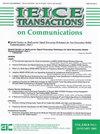NOMA-Based Highly-Efficient Low-Latency HARQ with Inter-Base Station Cooperation for URLLC
IF 0.6
4区 计算机科学
Q4 ENGINEERING, ELECTRICAL & ELECTRONIC
引用次数: 0
Abstract
SUMMARY This paper extends our previously reported non-orthogonal multiple access (NOMA)-based highly-efficient and low-latency hybrid automatic repeat request (HARQ) method for ultra-reliable low latency communications (URLLC) to the case with inter-base station cooperation. In the proposed method, delay-sensitive URLLC packets are preferentially multiplexed with best-effort enhanced mobile broadband (eMBB) packets in the same channel using superposition coding to reduce the transmission latency of the URLLC packet while alleviating the throughput loss in eMBB. Although data transmission to the URLLC terminal is conducted by multiple base stations based on inter-base station cooperation, the proposed method allocates radio resources to URLLC terminals which include scheduling (bandwidth allocation) and power allocation at each base station independently to achieve the short transmission latency required for URLLC. To avoid excessive radio resource assignment to URLLC terminals due to independent resource assignment at each base station, which may result in throughput degradation in eMBB terminals, we employ an adaptive path-loss-dependent weighting approach in the scheduling-metric calculation. This achieves appropriate radio resource assignment to URLLC terminals while reducing the packet error rate (PER) and transmission delay time thanks to the inter-base station cooperation. We show that the proposed method significantly improves the overall performance of the system that provides simultaneous eMBB and URLLC services.基于noma的URLLC基站间高效低延迟HARQ
本文将基于非正交多址(NOMA)的高效低延迟混合自动重复请求(HARQ)方法扩展到超可靠低延迟通信(URLLC)的基站间合作情况。该方法将时延敏感的URLLC报文与同一信道的eMBB (best-effort enhanced mobile broadband)报文通过叠加编码优先复用,以降低URLLC报文的传输时延,同时减轻eMBB的吞吐量损失。虽然URLLC终端的数据传输是由多个基站基于基站间协作进行的,但该方法将无线资源独立分配给URLLC终端,包括各基站的调度(带宽分配)和功率分配,以实现URLLC所需的短传输延迟。为了避免由于每个基站的独立资源分配而导致URLLC终端的无线电资源分配过多,这可能导致eMBB终端的吞吐量下降,我们在调度度量计算中采用了自适应路径损耗相关加权方法。通过基站间的协作,实现了对URLLC终端的合理无线电资源分配,同时降低了包错误率和传输延迟时间。结果表明,该方法显著提高了同时提供eMBB和URLLC服务的系统的整体性能。
本文章由计算机程序翻译,如有差异,请以英文原文为准。
求助全文
约1分钟内获得全文
求助全文
来源期刊

IEICE Transactions on Communications
工程技术-电信学
CiteScore
1.40
自引率
28.60%
发文量
101
审稿时长
3.7 months
期刊介绍:
The IEICE Transactions on Communications is an all-electronic journal published occasionally by the Institute of Electronics, Information and Communication Engineers (IEICE) and edited by the Communications Society in IEICE. The IEICE Transactions on Communications publishes original, peer-reviewed papers that embrace the entire field of communications, including:
- Fundamental Theories for Communications
- Energy in Electronics Communications
- Transmission Systems and Transmission Equipment for Communications
- Optical Fiber for Communications
- Fiber-Optic Transmission for Communications
- Network System
- Network
- Internet
- Network Management/Operation
- Antennas and Propagation
- Electromagnetic Compatibility (EMC)
- Wireless Communication Technologies
- Terrestrial Wireless Communication/Broadcasting Technologies
- Satellite Communications
- Sensing
- Navigation, Guidance and Control Systems
- Space Utilization Systems for Communications
- Multimedia Systems for Communication
 求助内容:
求助内容: 应助结果提醒方式:
应助结果提醒方式:


